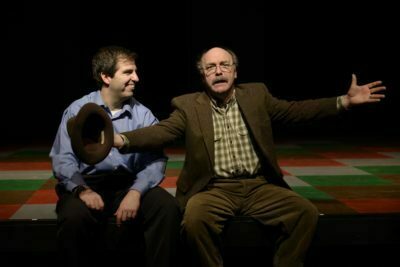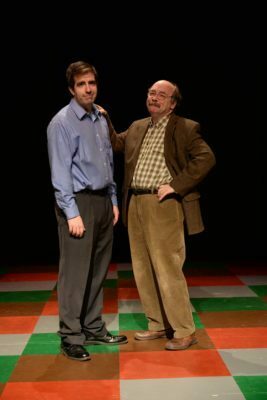Tuesdays With Morrie at Provision Theatre
By Jeffrey Hatcher and Mitch Albom
Based on the New York Times #1 Bestselling book by Mitch Albom
Directed by Timothy Gregory
Produced by Provision Theater, Chicago
“Is today the day, little bird?”
A Poignant Reflection on Life and Death
After seeing a production, one of the first things I do is read the producing company’s mission statement. All theatre companies have one. Many of them are verbose and comprised of ambiguous words like “connectivity” and “community,” or are otherwise redundant with claims of “engaging audiences” and “raising thought-provoking questions” – apparently an effort to demonstrate to their respective Boards, donors, and grantors that they do, in fact, know what theatre is. Wisely (perhaps), these mission statements are normally so vague that virtually any play might satisfy even the most scrupulous comparative evaluation.

Never before, however, have I seen a production that so embodies its company’s mission statement as Tuesdays With Morrie does of Provision Theater’s. Directed by Timothy Gregory, Tuesdays With Morrie is a play rife with “hope, reconciliation, and redemption,” and one that, if nothing else, “challenge[s] us to explore a life of meaning and purpose.” And, with its prudent direction and performances that stir one’s emotions without undue schmaltz, it is, moreover, a very wonderful and meaningful production that is suitable and recommended for all.
The play begins in the present, with Mitch Albom (Colin Wasmund) softly playing a grand piano as he introduces to us his college professor and good friend Morrie Schwartz (Brad Armacost). Curiously, we watch as Morrie dances a few different styles, and then Mitch draws us into the past to show us how he and Morrie first met and came to develop their strong bond over Tuesday luncheons. After four years of these meetings, in 1979, Mitch graduates from college, and, in a poignant farewell, promises Morrie he will definitely keep in touch.

But then, as they say, life happens. Mitch moves to New York with his uncle to become a Jazz pianist, and, after some years with mediocre success, the death of his uncle prompts him to take a new direction with his life. So he goes back to college to study Journalism, and, by 1995, he has climbed the network ranks to become a prosperous and well-regarded sports journalist.
That’s when, scanning the tube one night, Mitch comes across a Ted Koppel interview on Nightline. The interviewee: Morrie Schwartz. His once close and beloved college professor has been diagnosed with ALS (Lou Gehrig’s Disease). Though it’s been sixteen years now since they’ve spoken, Mitch decides to make a visit. But what was intended only to be a brief, one-time consolatory visit turns into “a weekly pilgrimage” and a final lesson on the meaning of life – and death (aptly phrased, from Provision’s synopsis).
What follows – dialogues and anecdotes about a life lived fully and a death fully embraced – defies concise synopsis. Suffice to say, as Morrie’s health slowly declines, so, too, does Mitch’s pride and vacuous sense of achievement, until, at the end, one life ends and a new life begins.

Any play described as depicting a “last class on the meaning of life” must certainly contend with the risk of being preachy and overly sentimental, and, having never read Albom’s book or seen the film adaptation (though the latter appears so cloying as to turn one’s stomach), I was certainly skeptical to see how such a feat could be accomplished. To my great satisfaction, however, despite the nearly total absence of the fourth wall – usually something I gravely dislike – there is never a moment in this production that comes across this way – and for this I can only credit the superb direction and performances.
Timothy Gregory, being the co-founding Artistic Director of Provision Theater, must be well-attuned to an audience’s aversion to being “taught,” especially given Provision’s production history and its mission, which he likely helped devise; for, in a play abounding in aphorisms delivered by a professor who, even unto death, loves to teach, never did I feel The Educator’s stern forefinger prodding my ignorant soul to obey. Moreover, I never felt The Sentimentalist’s swooning tremolo slacken the story with mawkish sentimentality. Rather, Morrie’s wisdom flows naturally from his character into the world of play, and the truths he speaks are never dogmatically asserted or weepily belabored but sincerely offered for anyone who cares to ponder them.
While some credit must surely go to the playwright for the deft avoidance of the abhorred preachy tone and mawkish mood, I credit more the spellbinding performance of Brad Armacost as Morrie. Colin Wasmund plays a rather milquetoast Mitch, but I found him to complement perfectly the jovial, enthusiastic energy of Armacost’s Morrie, whose vivacity, charisma, and (progressively decrepit) physicality are as arresting to the eye as they are to the heart. I don’t think there can be any higher a praise than to say that I so whole-heartedly believed Armacost’s performance that, by the end, I loved Morrie as much as Mitch did and painfully wished I had had such a mentor in my own life. There is a palpable sense of having lost someone dear at the end – and that is something I have rarely felt leaving a theatre performance. To put it another way, I should have brought tissues.
The question of how to live a “good life,” a life rich in meaning and purpose, is as old as it is seemingly without absolute, universal answer. Tuesdays With Morrie brings this question to fore of our minds – somewhere we may seldom find it – and juxtaposes it with its absolute limit: death. “I do as the Buddhists do,” Morrie tells Mitch, “Every day, I have a little bird on my shoulder that asks, ‘Is today the day? Am I ready? Am I doing all I need to do? Am I being the person I want to be? Is today the day I die?’” In our pell-mell world of wanton entertainment and immediate gratification, a play that shakes us with the sobering question of our being towards death can be as rare to find – anywhere – as it can be disconcerting to behold. Fortunately, Morrie’s more hearthstone than brimstone, and there’s plenty of warm humor to ease the load, making Tuesdays With Morrie a wonderfully vivacious and poignant play for all to see.
Highly Recommended
August Lysy
Reviewed on 21 February 2016.
Playing at Provision Theater, 1001 W. Roosevelt Rd., Chicago. Tickets are $30 with Senior, Student, Military, and Group discounts available. For tickets and information, call the Provision Theater box office at 312-455-0066. Performances are Fridays and Saturdays at 8 p.m., and Sundays at 3 p.m. through March 20. Running time is 90 minutes with no intermission.
